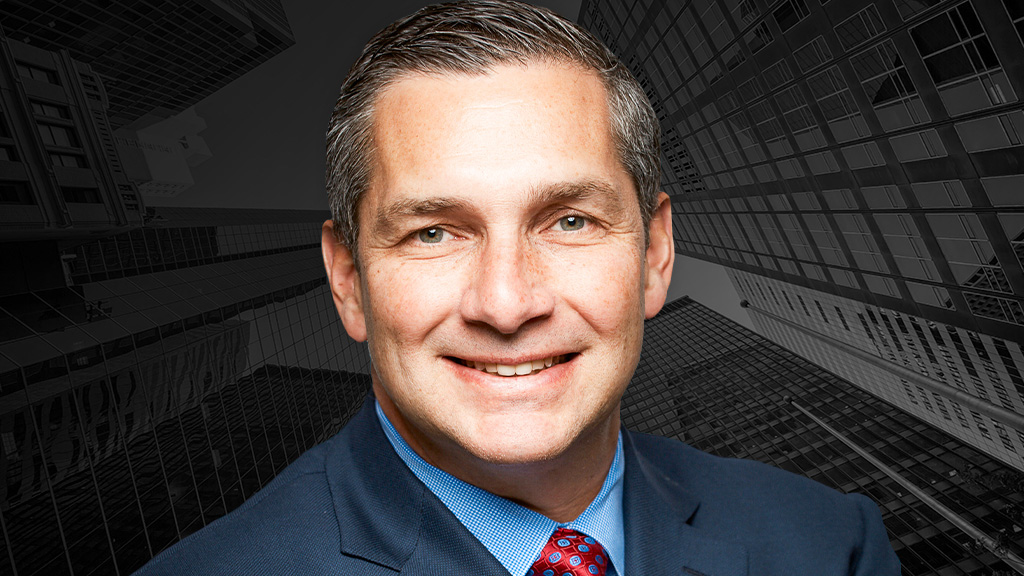Tom Michaud
President and CEO of Keefe, Bruyette & Woods
In a world dominated by headlines on tariffs, market turbulence, and geopolitical uncertainty, I couldn’t think of a better guest than Tom Michaud to help us make sense of it all.
Tom is the President and CEO of Keefe, Bruyette & Woods (KBW), a leading investment bank focused on financial services. He’s also a long-time friend and one of the smartest minds on Wall Street. His insights on a recent Walker Webcast cut through the noise with clarity and strategic depth.
Fortress balance sheets, fragile sentiment
Tom opened with a market snapshot that feels all too familiar: uncertainty reigns. Despite the optimism following Trump’s re-election and hopes for deregulation, the reality is a late-cycle environment filled with volatility. Stocks are trading down roughly 30 percent from recent highs, and while credit remains pristine in the banking sector, investors are pricing in a potential recession. Channel checks indicate stress-testing is the name of the game, not just in bank portfolios but in the investor psyche.
Rates, recession, and risk
We dove deep into the macro forces at play. Surging Treasury yields, halted earnings guidance from major players like Walmart and Delta, and a 10-year Treasury stuck at uncomfortable highs suggest that risk-off sentiment is spreading fast. Tom emphasized that this isn’t a credit crisis. Instead, it’s about technicals, psychology, and a lack of conviction in where we’re headed. He noted that non-bank financials have grown rapidly post-COVID and could be where cracks show first—particularly since they haven’t been through a real cycle yet.
Regulation, reform, and where banks stand
Tom has been on Capitol Hill pushing for deposit insurance reform since the collapses of SVB, Signature, and First Republic. He made it clear: the $250,000 FDIC insurance cap is outdated. Mid-size banks—those essential to small business lending—need a regulatory framework that reflects their role and risks. Without reform, future stress could drive more deposits to too-big-to-fail institutions, further concentrating the banking system.
Non-banks and the need for a level playing field
Perhaps most compelling was our discussion on the shadow banking world. With private equity giants like Blackstone and Ares growing their credit arms, the systemic risk posed by their scale is real, even if the investors are “qualified.” Tom suggested a presidential working group to assess and even out the regulatory imbalance between banks and non-banks. When banks are handicapped by capital requirements that their non-bank competitors don’t face, capital flows to the shadows and policymakers lose visibility.
M&A: Not dead, just waiting
Tom shared that despite the current chaos, the fundamentals of M&A remain strong. With reduced antitrust friction under Trump 2.0 and pent-up deal flow from PE exits, the groundwork for a resurgence in activity is in place. As he said, “Disorderly markets are the enemy of M&A.” When stability returns—and it will—expect deals to follow. KBW itself advised on four bank mergers in a single week, signaling that deal activity isn’t dead, just delayed.
Raising capital in a dislocated market
For real estate and private equity players, capital raising was challenging well before tariffs started making headlines. Institutional investors demand returns on older funds before committing to new ones, and international capital has gone quiet. Continuation vehicles are one solution, but until values normalize, fundraising will remain uphill.
Lead with clarity, act with care
Tom’s final advice to leaders? Survive without taking career-ending risks. “Just do the next right thing,” he said. Keep the team focused, reduce leverage, and be ready to act when the turn comes. At KBW, that philosophy helped the team weather the Great Financial Crisis and even rebuild from the unimaginable loss of 67 colleagues on 9/11. The firms that win in times like these are the ones that stay focused, stay values-driven, and stay together.
Want more?
As host of the Walker Webcast, I have the privilege to converse with fascinating people like Tom Michaud every week. Subscribe to the Walker Webcast to see our upcoming guests.
At a glance
Related Walker Webcasts
The Most Insightful Hour in CRE Part 24 with Dr. Peter Linneman
Learn More
January 28, 2026
Finance & Economy
Navigating the Complex Housing Market with Stephen Scherr
Learn More
October 22, 2025
Finance & Economy
The Most Insightful Hour in CRE Part 23 with Dr. Peter Linneman
Learn More
October 8, 2025
Finance & Economy
Insights
Check out the latest relevant content from W&D
News & Events
Find out what we're doing by regulary visiting our News & Events pages
